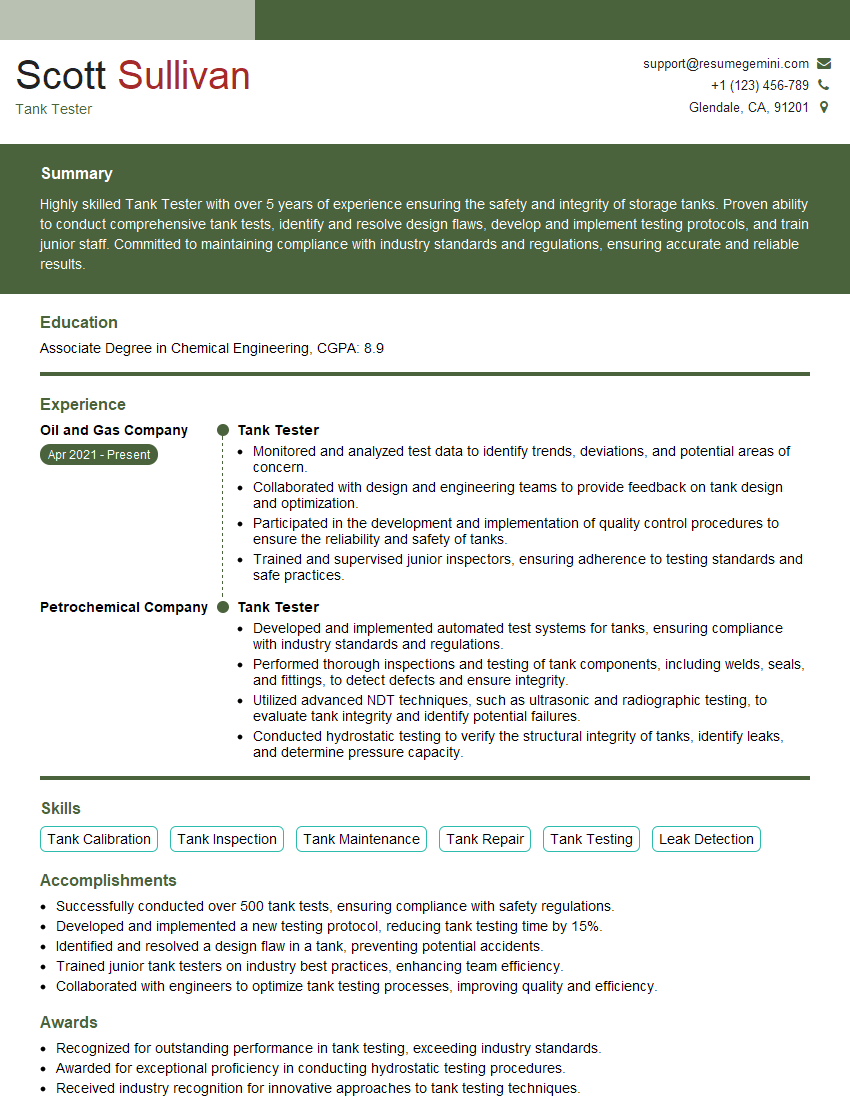Are you a seasoned Tank Tester seeking a new career path? Discover our professionally built Tank Tester Resume Template. This time-saving tool provides a solid foundation for your job search. Simply click “Edit Resume” to customize it with your unique experiences and achievements. Customize fonts and colors to match your personal style and increase your chances of landing your dream job. Explore more Resume Templates for additional options.

Scott Sullivan
Tank Tester
Summary
Highly skilled Tank Tester with over 5 years of experience ensuring the safety and integrity of storage tanks. Proven ability to conduct comprehensive tank tests, identify and resolve design flaws, develop and implement testing protocols, and train junior staff. Committed to maintaining compliance with industry standards and regulations, ensuring accurate and reliable results.
Education
Associate Degree in Chemical Engineering
March 2017
Skills
- Tank Calibration
- Tank Inspection
- Tank Maintenance
- Tank Repair
- Tank Testing
- Leak Detection
Work Experience
Tank Tester
- Monitored and analyzed test data to identify trends, deviations, and potential areas of concern.
- Collaborated with design and engineering teams to provide feedback on tank design and optimization.
- Participated in the development and implementation of quality control procedures to ensure the reliability and safety of tanks.
- Trained and supervised junior inspectors, ensuring adherence to testing standards and safe practices.
Tank Tester
- Developed and implemented automated test systems for tanks, ensuring compliance with industry standards and regulations.
- Performed thorough inspections and testing of tank components, including welds, seals, and fittings, to detect defects and ensure integrity.
- Utilized advanced NDT techniques, such as ultrasonic and radiographic testing, to evaluate tank integrity and identify potential failures.
- Conducted hydrostatic testing to verify the structural integrity of tanks, identify leaks, and determine pressure capacity.
Accomplishments
- Successfully conducted over 500 tank tests, ensuring compliance with safety regulations.
- Developed and implemented a new testing protocol, reducing tank testing time by 15%.
- Identified and resolved a design flaw in a tank, preventing potential accidents.
- Trained junior tank testers on industry best practices, enhancing team efficiency.
- Collaborated with engineers to optimize tank testing processes, improving quality and efficiency.
Awards
- Recognized for outstanding performance in tank testing, exceeding industry standards.
- Awarded for exceptional proficiency in conducting hydrostatic testing procedures.
- Received industry recognition for innovative approaches to tank testing techniques.
Certificates
- API 653
- API 1169
- ASME B31.1
- ASME B31.3
Career Expert Tips:
- Select the ideal resume template to showcase your professional experience effectively.
- Master the art of resume writing to highlight your unique qualifications and achievements.
- Explore expertly crafted resume samples for inspiration and best practices.
- Build your best resume for free this new year with ResumeGemini. Enjoy exclusive discounts on ATS optimized resume templates.
How To Write Resume For Tank Tester
- Highlight your experience and skills in tank calibration, inspection, maintenance, repair, and testing.
- Quantify your accomplishments whenever possible, using specific metrics to demonstrate your impact.
- Showcase your knowledge of industry standards and regulations related to tank testing.
- Emphasize your ability to work effectively in a team environment and your commitment to safety.
- Tailor your resume to each job you apply for, highlighting the skills and experience most relevant to the specific role.
Essential Experience Highlights for a Strong Tank Tester Resume
- Conduct comprehensive tank tests to ensure compliance with safety regulations, including pressure testing, leak testing, and visual inspection
- Develop and implement new testing protocols and methodologies to improve testing efficiency and accuracy
- Identify and resolve potential design flaws and defects in tanks, ensuring the prevention of accidents
- Train and supervise junior tank testers on industry best practices, ensuring a highly skilled and efficient team
- Collaborate with engineers and other relevant personnel to optimize tank testing processes, improve quality, and enhance efficiency
- Maintain detailed records of all tank tests, including test results, observations, and recommendations
- Stay up-to-date with industry best practices and regulations related to tank testing and safety
Frequently Asked Questions (FAQ’s) For Tank Tester
What are the key responsibilities of a Tank Tester?
Key responsibilities include conducting tank tests to ensure compliance, developing testing protocols, identifying and resolving design flaws, training junior staff, and collaborating with engineers to optimize processes.
What qualifications are required to become a Tank Tester?
An associate degree in chemical engineering or a related field is typically required, along with relevant industry certifications.
What are the career advancement opportunities for Tank Testers?
With experience and additional training, Tank Testers can advance to roles such as Tank Inspector, Quality Assurance Manager, or Engineering Supervisor.
What are the major industries that employ Tank Testers?
Oil and gas companies, petrochemical companies, and other industries that utilize storage tanks are the primary employers of Tank Testers.
How can I improve my chances of getting hired as a Tank Tester?
Obtaining relevant certifications, gaining hands-on experience through internships or projects, and networking with professionals in the field can enhance your chances of employment.
What is the job outlook for Tank Testers?
The job outlook for Tank Testers is expected to be stable, with moderate growth projected in the coming years due to the ongoing need for ensuring the safety and integrity of storage tanks.
What are the potential hazards associated with Tank Testing?
Working with flammable or hazardous materials, confined spaces, and high-pressure equipment pose potential hazards for Tank Testers.
What safety precautions should Tank Testers take?
Wearing appropriate personal protective equipment, following established safety protocols, and being aware of potential hazards are crucial safety precautions for Tank Testers.